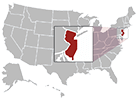
Becoming a nurse can be grueling, but the rewards are a lucrative and fruitful career where you get to help tens of thousands of people with their illnesses and injuries.
At nursing school, you can earn an associate’s (ADN), bachelor’s (BSN), master’s (MSN), or doctorate of nurse practitioner (DNP) degree.
Each level has a different pay scale and longer schooling requirements.
Garden State has some of the best colleges and universities in the U.S.
Since it’s wedged between Philadelphia and New York City, there are plenty of available jobs upon graduation.
If you’re interested in becoming a nurse in New Jersey, keep reading to learn more about the schools and process!
5 Registered Nurse Schools in New Jersey
New Jersey is a northeastern state with many colleges and universities offering nursing programs ranging from the associate to doctorate degrees.
Some of the best in the state include:
Caldwell University
![]()
Although a liberal arts school located only 20 minutes from New York City, Caldwell University requires 25 credits of nursing prerequisites and liberal arts core classes as part of the BSN program.
Since Caldwell is a Catholic, private institution, the tuition is $38,000 regardless of if you’re in-state or out-of-state.
Given its prime location and high-quality education, Caldwell is an excellent choice for students seeking a nursing program near a major city, ripe with jobs after graduation.
The NCLEX pass rate among Caldwell graduates is 83.33%.
Monmouth University
![]()
Monmouth University boasts every degree of a nursing program that a student desires, ranging from BSN to DNP.
In addition, this private university is consistently rated as one of the leading research institutions in the region, which is a significant appeal for those looking to get into the research side of healthcare.
In addition to the four-year traditional BSN track, the school also has an RN to BSN program for those current nurses that can be finished online.
Tuition for in-state and out-of-state students is $39,600 per year.
It’s also worth mentioning Monmouth University’s incredible NCLEX pass rate of 100%!
Montclair State University

Located in a suburb of New York City, Montclair State University (MSU) offers a four-year BSN degree and an 18-month accelerated Master’s Direct Entry to Nursing (MDE) program designed for students with bachelor’s degrees in unrelated fields.
The MDE has a heavy focus on transition management and care coordination.
Additional programs include online MSN, RN to MSN bridge, and RN to BSN bridge programs.
The annual tuition is an incredibly reasonable $6,900.
The College of New Jersey

The College of New Jersey also has a stellar nursing program and an NCLEX pass rate of 93.55%.
Located directly between Philadelphia and New York City, this institution has one of the highest four-year graduation rates in the United States among public schools.
Nursing students will partake in the traditional BSN program, which has a great 100% job placement for those who graduated in the past six months.
With affordable tuition of $17,980, The College of New Jersey offers an option for becoming a nurse.
William Paterson University of New Jersey

Just a short drive from New York City, on the edge of the wetlands and woodland, sits William Paterson University of New Jersey, one of the top nursing schools in the state.
Since it’s a public school, New Jersey residents enjoy the in-state tuition rate of $14,600.
While no online nursing options exist at the university, numerous undergraduate and graduate nursing programs are available, including the BSN, MSN, NP, and DNP.
The RN can be completed in two years, BSN in four years, MSN in another two years, and DNP two years after the masters.
Registered Nurse Schools in New Jersey – Summary Table
Top 5 Schools in New Jersey
| School Name | Address |
|---|---|
| Caldwell University | 120 Bloomfield Ave, Caldwell, NJ 07006 |
| Monmouth University | 400 Cedar Ave, West Long Branch, NJ 07764 |
| Montclair State University | 1 Normal Ave, Montclair, NJ 07043 |
| The College of New Jersey | 2000 Pennington Rd, Ewing Township, NJ 08618 |
| William Paterson University | 300 Pompton Rd, Wayne, NJ 07470 |
Salary
Given its location between two major cities, the average nursing salary is higher in New Jersey at $94,700, with a range of $67,800 to $121,600.
Annual Salary Range:Average Salary of Registered Nurse (RN)s in New Jersey
| City Name | Salary |
|---|---|
| Newark | $75,840 |
| Jersey City | $79,890 |
| Paterson | $76,570 |
| Elizabeth | $75,840 |
| Edison | $74,510 |
| Trenton | $71,770 |
| Camden | $71,140 |
| Dover | $76,140 |
| Woodbridge | $74,510 |
| Allentown | $71,770 |
Regional Salary in New Jersey
| Region | Employed | Avg. Annual Salary | Avg. Hourly Pay | Top 10% Annual Salary | Bottom 10% Annual Salary |
|---|---|---|---|---|---|
| Atlantic City-Hammonton, NJ | 3,500 | $96,560 | $46.42 | $117,750 | $78,820 |
| Trenton-Princeton, NJ | 5,330 | $101,570 | $48.83 | $120,390 | $80,790 |
| Vineland, NJ | 1,660 | $98,500 | $47.36 | $119,360 | $79,720 |
* Employment conditions in your area may vary.
Frequently Asked Questions
What are the typical functions of a New Jersey nurse?
Nurses are medical professionals who care for patients’ emotional and physical needs and their families.
Typical functions include assessing a patient’s condition, discussing it with the doctor, and carrying out a treatment plan.
This often includes checking vital signs, administering medication, monitoring the patient’s treatment progress, and performing tests.
Other tasks may consist of observing the patient for new symptoms, maintaining records, drawing blood, providing counseling, coordinating with healthcare providers, educating patients, and taking the patient’s health history.
How can you be a successful nurse in New Jersey?
There are several tips for being a successful nurse in New Jersey medical facilities.
First, always advocate for patients and fulfill their wishes where possible.
Second, find a more experienced mentor to help you navigate the workplace and job.
Third, nurses must pay attention to detail, including a patient’s symptoms and treatment plans.
Finally, ask plenty of questions to understand the next steps to take.
What is the process for becoming a nurse in New Jersey?
The first step is to finish an accredited nursing program at one of the many outstanding nursing schools in New Jersey.
Next, all nurses must pass the NCLEX-RN national exam to earn the license.
Then pass a background check and apply for the New Jersey state nursing license.
Once these requirements are completed, educational requirements don’t end.
You must maintain licensure by renewing every two years and complete 30 continuing education credits within that timeframe.
What is the typical nursing New Jersey work environment?
Nurses work in various healthcare settings, with hospitals being the most common.
However, nurses can work in home health care, senior living communities, pharmacies, clinics, correctional facilities, schools, and doctor’s offices.
Before jumping into this position, remember that nurses spend significant time on their feet.
It’s also important to note that nurses could have irregular shifts, including holidays, weekends, and nights, and regular business hours, depending on their working location.
What are the different nursing categories in New Jersey?
Several specializations exist within the nursing field, including ambulatory, emergency room, labor and delivery, home care, NICU, pediatric, school, educators, and surgical assistants.




